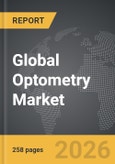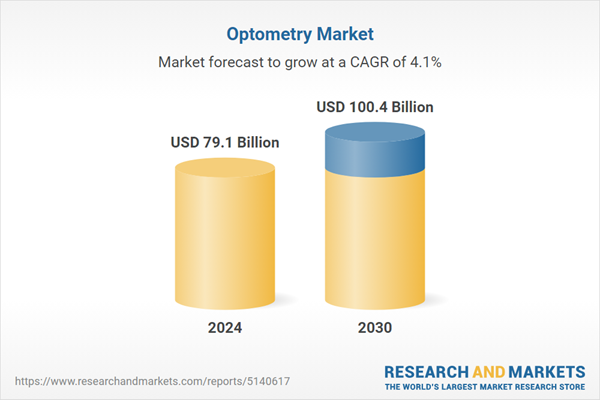Global Optometry Market - Key Trends & Drivers Summarized
What Is Optometry, and Why Is It So Crucial in Modern Eye Care?
Optometry is the branch of healthcare that focuses on the diagnosis, treatment, and management of eye health, vision disorders, and visual impairments. Optometrists, the primary practitioners in this field, are trained to conduct comprehensive eye exams, prescribe corrective lenses, diagnose and manage eye diseases, and provide pre - and post-operative care for ocular surgeries. They also play a significant role in detecting systemic conditions, such as diabetes and hypertension, that can present early signs through ocular symptoms.The importance of optometry lies in its ability to provide preventive eye care, address visual impairments, and improve quality of life through early detection and treatment of eye diseases. With the increasing prevalence of vision disorders like myopia, hyperopia, presbyopia, and astigmatism, along with age-related eye conditions such as cataracts, glaucoma, and macular degeneration, optometry has become essential in ensuring overall eye health. As populations age and digital device usage rises, optometry services are becoming increasingly critical for both routine eye care and complex ocular health management, supporting better vision outcomes and general well-being.
How Are Technological Advancements Shaping the Optometry Market?
Technological advancements have significantly enhanced diagnostic accuracy, treatment options, and patient management in optometry, driving innovation across eye care services. One major development is the introduction of advanced diagnostic devices like optical coherence tomography (OCT), fundus photography, and corneal topography. OCT, in particular, allows optometrists to visualize the layers of the retina in detail, facilitating early detection of conditions like glaucoma, macular degeneration, and diabetic retinopathy. Fundus cameras capture high-resolution images of the back of the eye, enabling detailed examination of the retina and optic nerve, while corneal topographers map the curvature of the cornea, assisting in contact lens fitting and the diagnosis of corneal disorders.The adoption of digital refraction systems has further improved the accuracy and efficiency of vision assessments. Automated refractors and phoropters enable optometrists to perform quick and precise vision tests, reducing the subjectivity associated with traditional methods. Digital lens measurement devices help in accurately determining the power of existing lenses and in prescribing corrective lenses, improving the precision of vision correction. These advancements in refractive technology have made routine eye exams faster, more accurate, and more comfortable for patients.
The rise of tele-optometry has expanded access to eye care, particularly in remote or underserved areas. Tele-optometry uses digital communication tools and remote diagnostic devices to conduct virtual eye exams and consultations, enabling optometrists to reach patients who may not have easy access to in-person services. Remote imaging devices, such as mobile fundus cameras and portable slit lamps, allow optometrists to perform essential eye checks virtually, facilitating early detection and timely intervention. This approach aligns with broader trends in telemedicine and digital healthcare, making optometry more accessible and adaptable in various healthcare settings.
What Are the Emerging Applications of Optometry Across Different Patient Groups?
Optometry is finding expanding applications across diverse patient groups, driven by the need for specialized vision care, preventive eye health, and management of chronic conditions. In pediatric eye care, optometrists play a crucial role in early vision screening, diagnosing conditions like amblyopia (lazy eye), strabismus (crossed eyes), and refractive errors that can affect learning and development. Early detection and correction of vision issues in children are vital for their cognitive and educational growth, making pediatric optometry an essential component of primary healthcare.In adult eye care, optometrists address a wide range of refractive errors and eye diseases, including presbyopia, cataracts, and dry eye syndrome. For presbyopia, which typically affects individuals over 40, optometrists provide solutions like multifocal lenses, reading glasses, and presbyopia-correcting contact lenses to improve near vision. Optometrists also manage dry eye syndrome, which has become increasingly common due to prolonged digital device use. Treatment options include artificial tears, prescription medications, and in-office procedures like meibomian gland expression or intense pulsed light (IPL) therapy to improve tear film stability and reduce symptoms.
In geriatric eye care, optometrists manage age-related vision changes and eye diseases like glaucoma, macular degeneration, and diabetic retinopathy. Optometrists perform comprehensive eye exams to monitor ocular health, manage chronic conditions, and provide rehabilitative services, such as low-vision aids, to help elderly patients maintain independence and quality of life. Optometrists also collaborate with ophthalmologists for surgical referrals and follow-up care when necessary, ensuring continuity of care for complex cases.
Optometry also plays a critical role in occupational vision care, supporting the eye health of individuals in specific work environments, such as computer-intensive jobs, aviation, and industrial settings. Optometrists provide vision assessments, blue light filters, specialized protective eyewear, and vision therapy to enhance performance and reduce eye strain in these settings. The expanding applications of optometry across these patient groups underscore its role in delivering comprehensive, tailored, and preventive eye care for diverse populations.
What Drives Growth in the Optometry Market?
The growth in the optometry market is driven by several factors, including increasing prevalence of vision disorders, aging populations, rising demand for preventive healthcare, and advancements in eye care technology. One of the primary growth drivers is the global rise in refractive errors, such as myopia, which has reached epidemic proportions in many parts of the world, particularly in Asia. As digital screen use increases among both children and adults, conditions like digital eye strain and computer vision syndrome have become more common, prompting greater demand for optometry services and vision correction solutions.The aging population has further fueled demand for optometry services, as age-related eye conditions like cataracts, glaucoma, and macular degeneration become more prevalent. Older adults require regular eye exams, monitoring, and management to maintain optimal vision and detect early signs of disease. As life expectancy increases globally, optometrists play an essential role in providing routine eye care, managing chronic eye diseases, and offering rehabilitation services like low-vision aids to improve quality of life for seniors.
The growing emphasis on preventive healthcare and regular vision screening has also contributed to market growth. Public awareness campaigns and government initiatives promoting regular eye exams have increased patient visits to optometrists, supporting early detection and treatment of eye conditions. In many countries, optometry services are integrated into primary healthcare systems, making routine vision checks more accessible and encouraging broader participation in preventive eye care.
Advancements in optometry technology, such as digital imaging, AI-powered diagnostic tools, and tele-optometry, have improved the accuracy, efficiency, and reach of optometric care. AI-enhanced diagnostic tools can analyze retinal images, identify early signs of diseases like diabetic retinopathy and glaucoma, and assist optometrists in making faster, more accurate diagnoses. Tele-optometry has expanded access to vision care, enabling optometrists to provide consultations and follow-up services remotely, which is especially valuable in rural or underserved areas.
With ongoing innovations in diagnostic tools, treatment options, and digital healthcare, the optometry market is poised for continued growth. These trends, combined with increasing demand for vision correction, preventive care, and chronic disease management, make optometry a vital component of modern healthcare, supporting better vision outcomes and overall eye health across diverse populations.
Report Scope
The report analyzes the Optometry market, presented in terms of market value (US$ Thousand). The analysis covers the key segments and geographic regions outlined below.- Segments: Segment (Therapeutics, Vision Care Equipment).
- Geographic Regions/Countries:World; United States; Canada; Japan; China; Europe (France; Germany; Italy; United Kingdom; and Rest of Europe); Asia-Pacific; Rest of World.
Key Insights:
- Market Growth: Understand the significant growth trajectory of the Optometry Therapeutics segment, which is expected to reach US$38.3 Billion by 2030 with a CAGR of a 3.3%. The Vision Care Optometry Equipment segment is also set to grow at 4.6% CAGR over the analysis period.
Why You Should Buy This Report:
- Detailed Market Analysis: Access a thorough analysis of the Global Optometry Market, covering all major geographic regions and market segments.
- Competitive Insights: Get an overview of the competitive landscape, including the market presence of major players across different geographies.
- Future Trends and Drivers: Understand the key trends and drivers shaping the future of the Global Optometry Market.
- Actionable Insights: Benefit from actionable insights that can help you identify new revenue opportunities and make strategic business decisions.
Key Questions Answered:
- How is the Global Optometry Market expected to evolve by 2030?
- What are the main drivers and restraints affecting the market?
- Which market segments will grow the most over the forecast period?
- How will market shares for different regions and segments change by 2030?
- Who are the leading players in the market, and what are their prospects?
Report Features:
- Comprehensive Market Data: Independent analysis of annual sales and market forecasts in US$ Million from 2024 to 2030.
- In-Depth Regional Analysis: Detailed insights into key markets, including the U.S., China, Japan, Canada, Europe, Asia-Pacific, Latin America, Middle East, and Africa.
- Company Profiles: Coverage of players such as Allergan PLC, Bausch Health Companies Inc., CooperVision, Inc., Essilor International SA, Johnson & Johnson and more.
- Complimentary Updates: Receive free report updates for one year to keep you informed of the latest market developments.
Some of the 111 companies featured in this Optometry market report include:
- Allergan PLC
- Bausch Health Companies Inc.
- CooperVision, Inc.
- Essilor International SA
- Johnson & Johnson
- Novartis AG
- Pfizer, Inc.
- Vision Care, Inc.
This edition integrates the latest global trade and economic shifts into comprehensive market analysis. Key updates include:
- Tariff and Trade Impact: Insights into global tariff negotiations across 180+ countries, with analysis of supply chain turbulence, sourcing disruptions, and geographic realignment. Special focus on 2025 as a pivotal year for trade tensions, including updated perspectives on the Trump-era tariffs.
- Adjusted Forecasts and Analytics: Revised global and regional market forecasts through 2030, incorporating tariff effects, economic uncertainty, and structural changes in globalization. Includes historical analysis from 2015 to 2023.
- Strategic Market Dynamics: Evaluation of revised market prospects, regional outlooks, and key economic indicators such as population and urbanization trends.
- Innovation & Technology Trends: Latest developments in product and process innovation, emerging technologies, and key industry drivers shaping the competitive landscape.
- Competitive Intelligence: Updated global market share estimates for 2025, competitive positioning of major players (Strong/Active/Niche/Trivial), and refined focus on leading global brands and core players.
- Expert Insight & Commentary: Strategic analysis from economists, trade experts, and domain specialists to contextualize market shifts and identify emerging opportunities.
Table of Contents
Companies Mentioned (Partial List)
A selection of companies mentioned in this report includes, but is not limited to:
- Allergan PLC
- Bausch Health Companies Inc.
- CooperVision, Inc.
- Essilor International SA
- Johnson & Johnson
- Novartis AG
- Pfizer, Inc.
- Vision Care, Inc.
Table Information
| Report Attribute | Details |
|---|---|
| No. of Pages | 258 |
| Published | February 2026 |
| Forecast Period | 2024 - 2030 |
| Estimated Market Value ( USD | $ 79.1 Billion |
| Forecasted Market Value ( USD | $ 100.4 Billion |
| Compound Annual Growth Rate | 4.1% |
| Regions Covered | Global |









